China’s rubber stamp parliament has approved a new national security law for Hong Kong that critics say threatens the city’s semi-autonomous status.
The National People’s Congress approved the controversial measure Thursday by a vote of 2,878 to one, with six members abstaining.
The new law would prevent and punish acts of “secession, subversion or terrorism activities” that threaten national security. The law would also allow Chinese national security organs to set up agencies in Hong Kong. The legislature’s Standing Committee will begin drafting details of the law, which is expected to take effect in September.
The legislation was widely condemned by business groups and Western nations as the death knell for Hong Kong’s status under the “one country, two systems” concept established after Britain handed over control of the financial hub to China in 1997, especially since it bypasses Hong Kong’s legislature.

Hong Kong police arrested dozens of protesters on May 27, 2020. (Photo courtesy of Hong Kong Police Facebook)
Beijing’s announcement of the national security law for Hong Kong last week sparked a new round of protests similar to the massive and often violent demonstrations that engulfed the city during the second half of 2019. The protests were initially provoked by a controversial extradition bill that eventually evolved into a demand for greater democracy for the city.
As many as 360 people were arrested Wednesday night to protest the national security bill.

Secretary of State Mike Pompeo speaks during a press briefing at the State Department on May 20, 2020, in Washington.
U.S. Secretary of State Mike Pompeo said Wednesday he has reported to the U.S. Congress that Hong Kong is “no longer autonomous from China” and “Hong Kong does not continue to warrant treatment under United States laws,” given facts on the ground.
The secretary’s remarks indicate the United States is considering suspending the preferential status that has made the city a top U.S. trading partner.
Hong Kong’s pro-democracy activists are also angry over legislature under consideration in the city’s Legislative Council, dominated by pro-Beijing lawmakers, that would criminalize disrespect of China’s national anthem. The legislature was forced to adjourn Thursday’s session after two pro-democracy lawmakers were ejected from the chamber during an angry debate over the anthem law.


